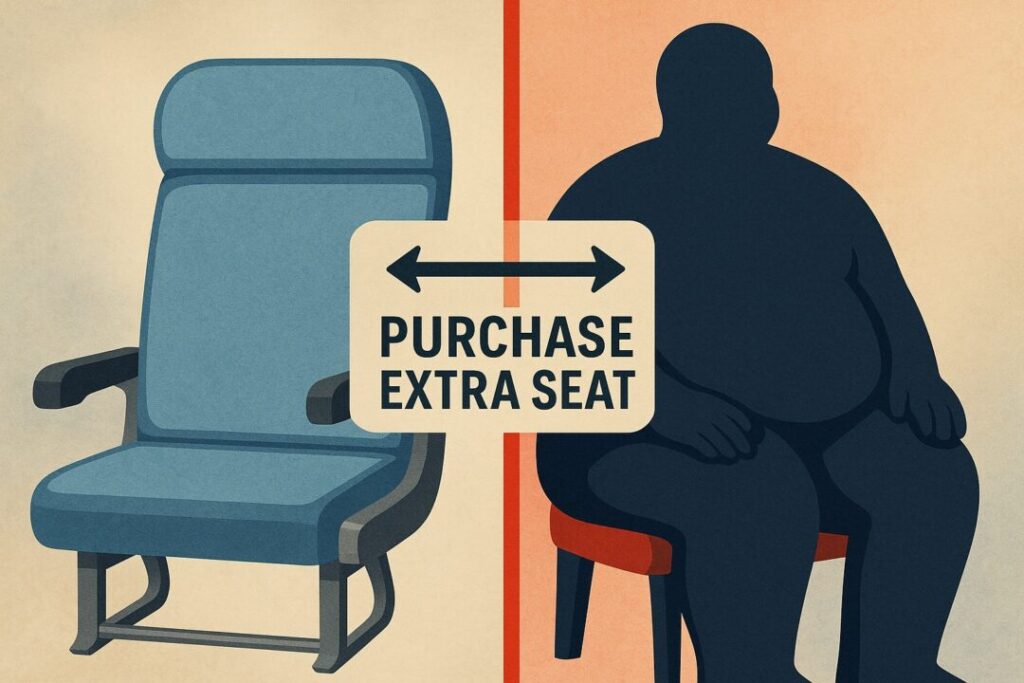Starting January 27, 2026, Southwest Airlines will change the way it handles passengers who take up more than one seat.
From that date forward, if a traveler “encroaches upon the neighboring seat,” they’ll be required to buy an extra ticket in advance.
The armrest will be the clear dividing line. If you can’t fit between the armrests, you need a second seat.
That might sound like common sense to many people, but it’s a big change from the airline’s long-standing “Customer of Size” policy, which had been praised by activists for being more forgiving.
For years, Southwest gave plus-size passengers the option to ask for a complimentary second seat at the airport or to purchase one in advance and later apply for a refund.
Even on full flights, Southwest often approved refunds, which set it apart from other airlines.
Now, things will work differently. Refunds on the second seat will only be given if:
- The flight leaves with an empty seat.
- Both tickets were bought in the same fare class.
- The refund request is made within 90 days.
If those conditions aren’t met, the extra seat is nonrefundable.
And if you show up at the airport without buying one in advance, you might be forced to buy a walk-up ticket – at a much higher price – or be rebooked on a later flight.
Southwest is a major player in Nevada travel.
Harry Reid International in Las Vegas is one of the airline’s largest hubs, and Southwest is also the biggest carrier at Reno-Tahoe International.
For many Nevadans, Southwest has been the go-to option because of its open seating and “two bags fly free” promise.
But both of those policies are going away. Assigned seating starts the same day as the new size rule, and free bags ended earlier this year.
That means costs could rise sharply for Nevadans who depend on Southwest for business trips, sports tournaments, or quick weekend getaways.
Families in Las Vegas who used to rely on free checked bags for kids’ luggage are already feeling the pinch.
Add in higher costs for plus-size passengers, and the “low-cost” airline suddenly doesn’t look so low-cost anymore.
Not everyone is upset. Some travelers argue this policy is long overdue. They believe every customer has the right to the space they paid for.
Many flyers have stories of being crammed into their seats, losing use of their armrest, or feeling uncomfortable during a full flight.
In fact, some social media users cheered the announcement, saying it puts Southwest in line with other major airlines like Delta, American, and JetBlue, which already require extra seats without offering refunds.
On the other side, critics see this as a harsh move that hurts those who already face challenges.
Tigress Osborn, head of the National Association to Advance Fat Acceptance, called the change “devastating.”
She argued Southwest had been the most inclusive airline and that this policy could discourage plus-size people from flying at all.
The backlash hasn’t just come from activists.
Even loyal customers in Nevada are voicing frustration, saying the company is abandoning the “Southwest spirit” that made it unique in the airline industry.
The reality is, Southwest is tightening its belt.
After years of selling itself as the friendly, customer-first airline, the company appears to be moving toward the same cost-cutting model as everyone else.
Higher fares, fewer freebies, and stricter policies are all part of the trend.
For conservatives, this raises a bigger question about fairness and responsibility.
Should every passenger have the right to the space they paid for, or should airlines continue subsidizing those who need more?
Most conservatives lean toward personal responsibility: if you need extra space, you should pay for it, just like if you check an extra bag or ask for more legroom.
Southwest’s new policy may feel like a shock, but it’s also a reminder of how the travel industry is changing.
For Nevadans, especially those in Las Vegas and Reno who rely on Southwest as the cheapest and most convenient option, it could mean rethinking how they book and budget trips.
Fairness, cost, and comfort are now colliding at 30,000 feet – and the days of Southwest being “different” may be coming to an end.
The opinions expressed by contributors are their own and do not necessarily represent the views of Nevada News & Views. This article was written with the assistance of AI. Please verify information and consult additional sources as needed.




